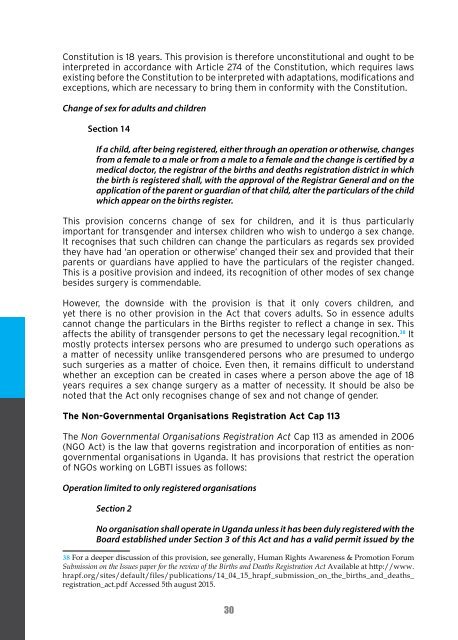PERSONS IN UGANDA
4Tks5WfQb
4Tks5WfQb
You also want an ePaper? Increase the reach of your titles
YUMPU automatically turns print PDFs into web optimized ePapers that Google loves.
Constitution is 18 years. This provision is therefore unconstitutional and ought to be<br />
interpreted in accordance with Article 274 of the Constitution, which requires laws<br />
existing before the Constitution to be interpreted with adaptations, modifications and<br />
exceptions, which are necessary to bring them in conformity with the Constitution.<br />
Change of sex for adults and children<br />
Section 14<br />
If a child, after being registered, either through an operation or otherwise, changes<br />
from a female to a male or from a male to a female and the change is certified by a<br />
medical doctor, the registrar of the births and deaths registration district in which<br />
the birth is registered shall, with the approval of the Registrar General and on the<br />
application of the parent or guardian of that child, alter the particulars of the child<br />
which appear on the births register.<br />
This provision concerns change of sex for children, and it is thus particularly<br />
important for transgender and intersex children who wish to undergo a sex change.<br />
It recognises that such children can change the particulars as regards sex provided<br />
they have had ‘an operation or otherwise’ changed their sex and provided that their<br />
parents or guardians have applied to have the particulars of the register changed.<br />
This is a positive provision and indeed, its recognition of other modes of sex change<br />
besides surgery is commendable.<br />
However, the downside with the provision is that it only covers children, and<br />
yet there is no other provision in the Act that covers adults. So in essence adults<br />
cannot change the particulars in the Births register to reflect a change in sex. This<br />
affects the ability of transgender persons to get the necessary legal recognition. 38 It<br />
mostly protects intersex persons who are presumed to undergo such operations as<br />
a matter of necessity unlike transgendered persons who are presumed to undergo<br />
such surgeries as a matter of choice. Even then, it remains difficult to understand<br />
whether an exception can be created in cases where a person above the age of 18<br />
years requires a sex change surgery as a matter of necessity. It should be also be<br />
noted that the Act only recognises change of sex and not change of gender.<br />
The Non-Governmental Organisations Registration Act Cap 113<br />
The Non Governmental Organisations Registration Act Cap 113 as amended in 2006<br />
(NGO Act) is the law that governs registration and incorporation of entities as nongovernmental<br />
organisations in Uganda. It has provisions that restrict the operation<br />
of NGOs working on LGBTI issues as follows:<br />
Operation limited to only registered organisations<br />
Section 2<br />
No organisation shall operate in Uganda unless it has been duly registered with the<br />
Board established under Section 3 of this Act and has a valid permit issued by the<br />
38 For a deeper discussion of this provision, see generally, Human Rights Awareness & Promotion Forum<br />
Submission on the Issues paper for the review of the Births and Deaths Registration Act Available at http://www.<br />
hrapf.org/sites/default/files/publications/14_04_15_hrapf_submission_on_the_births_and_deaths_<br />
registration_act.pdf Accessed 5th august 2015.<br />
30


